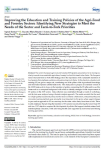Kurtsal Y., Rinaldi G.M., Savini F., Sirri R., Melin M., Pacetti E., De Cesare A., Fioravanti M., Luppi E., Manfreda G., Viaggi D. (2024). Improving the education and training policies of the agri-food and forestry sectors: identifying new strategies to meet the needs of the sector and farm-to-fork priorities. Sustainability, 01/02/2024, vol. 16, n. 3, p. 1267.
https://doi.org/10.3390/su16031267
https://doi.org/10.3390/su16031267
| Titre : | Improving the education and training policies of the agri-food and forestry sectors: identifying new strategies to meet the needs of the sector and farm-to-fork priorities (2024) |
| Auteurs : | Y. Kurtsal ; G.M. Rinaldi ; F. Savini ; R. Sirri ; M. Melin ; E. Pacetti ; A. De Cesare ; M. Fioravanti ; E. Luppi ; G. Manfreda ; D. Viaggi |
| Type de document : | Article |
| Dans : | Sustainability (vol. 16, n. 3, February 2024) |
| Article en page(s) : | p. 1267 |
| Langues : | Anglais |
| Langues du résumé : | Anglais |
| Catégories : |
Catégories principales 12 - EDUCATION. FORMATION. INFORMATION. GESTION DES SAVOIRS ; 12.5 - Formation Continue, Professionnelle. Gestion des CursusThésaurus IAMM ENSEIGNEMENT AGRICOLE ; EDUCATION ; INDUSTRIE ALIMENTAIRE ; FORESTERIE ; RESILIENCE ; DURABILITE |
| Résumé : | The current European agri-food and forestry (AFF) systems are perceived to be moving too slowly towards more sustainable agriculture, forestry, food and bio-based value chains. The European Green Deal and Farm to Fork (FtF) Strategy stress the importance of the sustainable transition of food systems that emphasize resilience and justice along food chains. In this direction, education and training (ET) are given a major role, constituting one of the pillars of the Agricultural Knowledge and Innovation Systems (AKIS) framework. This study aims to propose an extended version of the AKIS framework to focus on the transition of policies concerning the ET pillar and to use this framework as a conceptual background with which to identify strategies for the improvement of ET policies in the AFF sectors. Data collection was undertaken through a round of workshops, and the data were analyzed using a thematic analysis approach. The results revealed that the need for a high-quality educational policy and the need to enhance collaboration, entrepreneurship and innovative learning methods were among the most important for the sector, where urgent changes in pace and an approach in ET are necessary for the entire value chain, from farm to fork. These results emphasize that pivoting the transition of ET systems toward achieving the Green Deal, FtF and new CAP objectives requires the development of policies that support student-centered and interdisciplinary education, while also being flexible and supported by non-formal and lifelong learning approaches. |
| Cote : | En ligne |
| URL / DOI : | https://doi.org/10.3390/su16031267 |







